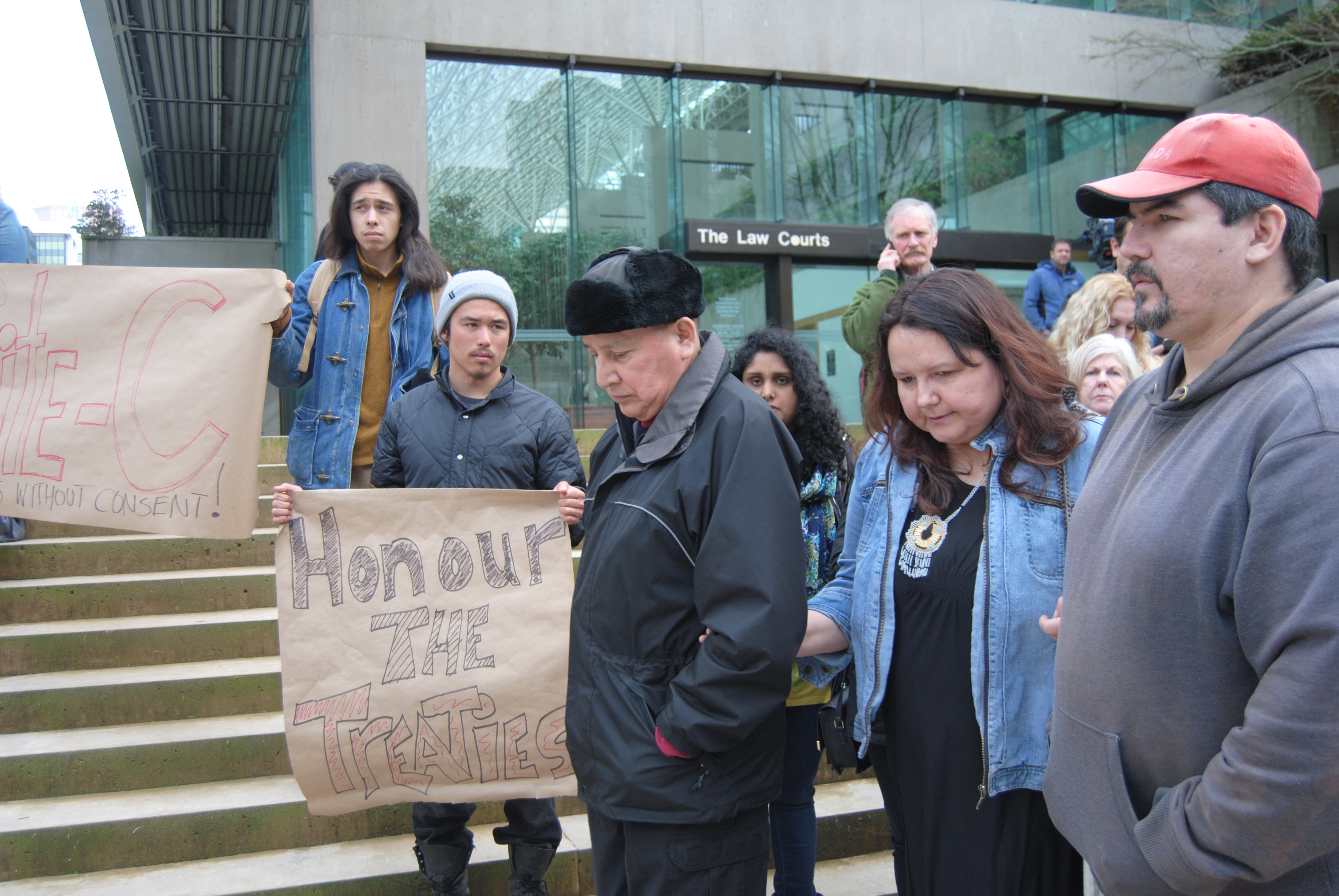Land Defenders Press on Despite BC Supreme Court Loss
Mar 3, 2016
Land Defenders Press on Despite BC Supreme Court Loss

Vancouver - Land defenders at Site C, the site of a hydroelectric dam in northeastern British Columbia, have been delivered a blow via the BC Supreme Court. An enforceable injunction has been granted to BC Hydro, which will allow construction to proceed unhindered.
The defenders, a group of local indigenous, landowners and business people, became legal defendants when BC Hydro, a crown corporation, decided it was prudent to take the Rocky Mountain Camp (RMC) and supporters to court.
With a ruling in favour of BC Hydro, the land defenders were given until midnight Feb. 29, 2016 to vacate an area set to be cleared for construction.
The decision does not surprise Yvonne Tupper, a Salteaux First Nation/Treaty 8 member, who attended the decision in person.
“We didn’t expect the provincial court or government to honour the treaty that guarantees Treaty 8 people access to the land,” Tupper said outside the Vancouver courts. “The treaty is federal.”
Stewart Phillip, Grand Chief of the Union of BC Indian Chiefs, also attended at court. “The judge decided to maintain the status quo today,” Phillip said. “This is not surprising at all. It’s another day at the office.”
BC Hydro is fully aware Treaty 8 territory is federal jurisdiction and decided to take RMC residents and supporters to provincial court regardless. Phillip did not pull punches addressing this fact.
“BC Hydro, to me, has always considered itself above the law and conducted itself as such,” Phillip said. “It is a crown corporation that has enjoyed ramming its projects through for many, many decades now and that was readily apparent in their approach to this case. Hydro is the most mismanaged crown corporation on the face of the planet.”
BC Hydro claims power produced by Site C dam will go toward about one third or 500,000 homes in British Columbia, but others challenge the residential need saying that Site C will be used to power industrial projects.
BC Hydro’s lawyers, while submitting evidence, stated that an injunction hearing is not the venue to deal with maters outside whether the RMC land defenders infringed upon Site C’s ability to complete work.
BC Hydro’s lawyers were permitted to use social media postings and video recorded by Site C security guards to prove infringement of work had, in fact, occurred. Attempts by the defendant’s legal team to strike social media and other evidence as hearsay were denied.
Tupper and many others set up the camp on New Year’s Eve in the hope that the right to access traditional land, guaranteed in Treaty 8, would be upheld and an injunction would not be brought down.
“We’re not altogether opposed to this project,” Tupper said. “We’re just opposed to the placement. We don’t want any further development on the Peace [River]. We will continue to oppose this project and seek justice going forward.”
One of the main reasons for the injunction decision by Justice Bruce Butler was the amount of work and money already poured into the estimated $8 billion megaproject.
“With nearly $700 million already spent by BC Hydro it is clear that the project is well underway,” Justice Butler said in court, reading from his decision.
He cited the 36 authorizations, including logging and rock removal, the B.C. government and its various ministries have granted the crown corporation thus far.
“The arguments BC Hydro brought forward to the bench, which were used in the judges decision, may have applied a decade ago,” Phillip said.
But a similar injunction against Tahltan land defenders was not upheld recently in the Doubleview v. Day case, which was a pre-trial attempt at injunction.
In that case, Justice Christopher Grauer heard evidence regarding Doubleview’s legal right to occupy, but also noted the significant cultural importance of the area to the Tahltan in his decision.
For the Site C case, no evidence countering the claims of trespass, nuisance or prevention of irreparable harm was brought forth by the defendants.
Despite the set back Phillip and Tupper are undaunted.
“With the three appeal cases currently underway there is the potential we can
overturn a lower court ruling,” Phillip said. “Then it’s a whole new ball game.”
Tupper pointed to Ottawa for the seeking of future remedy.
“We have 40 years of opposing this project in its current form,” Tupper said. “This dam is not needed. It has a short lifespan compared to our Treaty 8 rights, which are forever.”
The RMC camp will now regroup and make plans to either appeal or focus on the three cases currently seeking judicial review of the granting of permits and the environmental assessment approval.

